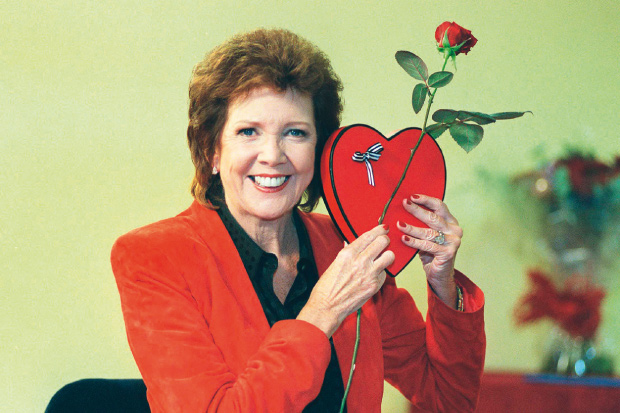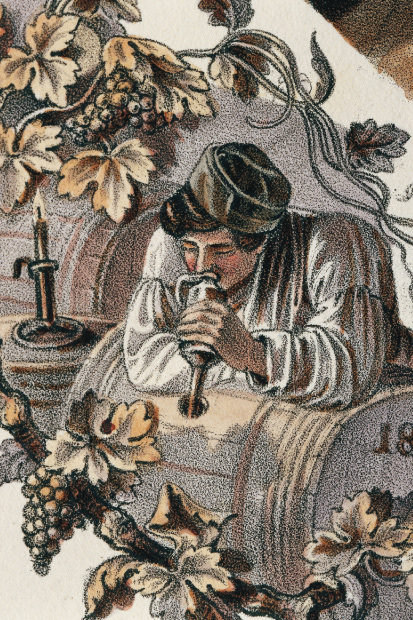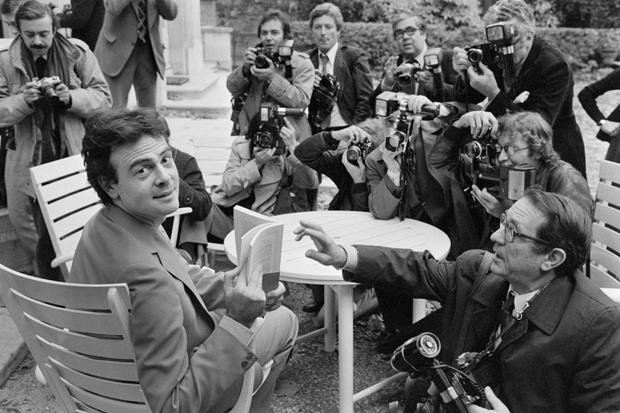Cilla Black has become a strange creature during her 50 years in showbiz. When her husband Bobby was in hospital she found to her dismay that she didn’t now how to take the dogs for a walk. That was some time ago, for Bobby Willis died of liver cancer in 1999. ‘They lived their lives almost like Siamese twins,’ writes Douglas Thompson in Cilla, Queen of the Swinging Sixties (Metro, £7.99, Spectator Bookshop, £7.59).
He is an old hand in Cillagraphy, having published Cilla Black: Bobby’s Girl in 1998 and Cilla: the Biography in 2002. He is not the author of this year’s Cilla: the Adventures of a Welsh Mountain Pony, which will disappoint fans since it makes no reference to the long-term hostess of Blind Date (1985–2003). Even Thompson admits that critics knocked the ‘prurience’ of Blind Date ‘with much justification’, but the dominant mood of the biography, when not that of melancholy, is resentment.
That might seem odd in someone from a poor home in Liverpool (now of Denham, Bucks) who decided to spend half a million on a pink diamond ring and £160,000 on a Ferrari at the same time. But why wouldn’t Harold Wilson invite her to 10 Downing Street? (‘My father was very, very upset.’) Then in 1970, on a flight to the south of France, she was downgraded from first class: ‘I’ve never been downgraded in my life.’ No wonder she had to confide her troubles to Frankie Howerd, ‘the father I went to when not even my husband could help’. But husband Bobby at least got Frankie’s old tweed coat when he died, ‘and it still smells of Frankie’.
Joey Essex, ‘male grooming icon’, beats Cilla’s incapacity for simple tasks by never having learnt to tell the time or to blow his nose. In him, this is a selling point, for the pinnacle of his career, from 2011–13, was in the vacuous galaxy of The Only Way is Essex, the ‘scripted reality’ show. Joey really is called Essex but was born in Southwark 24 years ago. He relies on good looks and cheerfulness, and successfully hides his native intelligence.
Tesco marketed some hair gel called Joey Essex D’Reem Hair, because Joey likes using his own slang, in which one term of approval is reem. In Being Reem (Hodder & Stoughton, £7.99, Spectator Bookshop, £7.59), the editors have appended some pages of Tweets from fans. @Michelle4uxxx wrote: ‘ “Yo yo yo ma name is Joe” “What are you saying” “REEM” that’s why we love you, because of the amazing looks, hair and personality.’ There’s also a short Joey Dictionary: Capri Sun = Stupid; Baffed = Baffled; Salty Potato = A good-looking girl.
So readers of Being Reem feel they belong to a club — like the Ovaltineys. Joey’s ghost writer Lucie Cave has made things lively, interspersing print with snippets in simulated handwriting: ‘Some of my habits: waggling my foot; biting my nails, putting my hands down my pants when I talk to people, blowing bubbles to help me think.’ Keep on blowing bubbles, Joey.
Dear Roger Moore, at 86, is at the other end of his D’Reem career. He proves in Last Man Standing (Michael O’Mara, £20, Spectator Bookshop, £17), his second autobiographical bash, that he knew everyone in films. He calls them by the right names. John Mills? No, Johnny. Diana Dors? No, Di.
Roger likes to add a little value-added punchline to anecdotes. After a story (which he must realise everyone has heard) about Diana Dors, real name Diana Fluck, being referred to in a public speech as Diana Clunt, he adds: ‘Diana wet herself with laughter.’ When the producer Peter Rogers heard Kenneth Williams say ‘I’ll be there in a few minutes,’ as a nurse massaged him with ointment, what was his reaction? ‘Peter almost wet himself with laughter.’ Another trick that he finds useful to indicate humour is the exclamation mark. ‘Frank Sinatra used to say, “Who’s going to be left to turn the light off?” Hopefully, it’ll be me!’
He can also round off a funny story with a dying fall. After a hilarious story about a Mrs Rex Harrison, he writes of ‘her alcoholism and depression eventually leading to her suicide in 1980, aged just 53. It was terribly sad.’ After an equally hilarious story about Peter Sellers, he says: ‘The feeling of rejection ultimately led to his son Michael’s early death. Very sadly, Michael died at 52.’
Dermot O’Leary does not live in the tatworld dystopia that celebrities construct for themselves, but he is a professional guide to it. A safe pair of hands as a television presenter, his low point perhaps came with Shattered (2004), in which contestants had to try to keep awake for seven days. What about the viewers? He has unembarrassedly presented Big Brother’s Little Brother (2001–08) and The X Factor since 2007. On Radio 2 he has fronted a music programme on Saturday afternoons since 2004. In The Soundtrack to My Life (Hodder & Stoughton, £20, Spectator Bookshop, £16) he takes 27 songs, from ‘The Floral Dance’ by Terry Wogan (dear, oh, dear) to ‘Rehab’ by Amy Winehouse, to accompany his memoirs. He likes lyrics and he likes playing with words. Last time I looked, his book was selling on Amazon better than Joey Essex’s.
What buyers surely looked for in the memoirs of Luis Suárez was something to get their teeth into, a story with a little bite. In Crossing the Line (Headline, £20, Spectator Bookshop, £16), attempting to explain his unique treble as a footballer, he seems to have bitten off more than he can chew: ‘I’m still trying to explain it to myself, to understand what happens and why.’ He does make the almost Wittgensteinian observation that he is equally unable to explain how he scores goals.
As a consolation prize we learn of the boy from the callejón, the back alley in
Montevideo, kicking a ball around when other folk were buying cocaine or sniffing glue, and finding the dream come true of playing before 98,000 at Barcelona’s Camp Nou. But it is the inexplicable that has left poor old Luis (aged 27) with a nasty taste in the mouth.
Got something to add? Join the discussion and comment below.
Get 10 issues for just $10
Subscribe to The Spectator Australia today for the next 10 magazine issues, plus full online access, for just $10.
You might disagree with half of it, but you’ll enjoy reading all of it. Try your first month for free, then just $2 a week for the remainder of your first year.














Comments
Don't miss out
Join the conversation with other Spectator Australia readers. Subscribe to leave a comment.
SUBSCRIBEAlready a subscriber? Log in